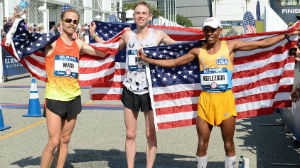Train Like an Olympian
The Olympic Marathon Trials certainly were entertaining this past weekend. There were so many story lines to follow. You had the BFFs Amy and Shalane working together to defeat the heat; Desi sticking with her game plan and letting the leaders go ahead early only to reel them in as the attrition set in; Rupp, the king of U.S. distance running, masterfully debuting in the marathon; Meb, the savvy veteran, making the right moves to earn his way onto his 4th Olympic Team; and finally, some guy named Jared, who put his masters thesis (proper pacing for the marathon) to work, earning the third and final spot on the team for Rio.

The most fascinating aspect about the Trials, however, was listening to the rest of us—mere mortal runners—identifying with the elites as they pushed their limits to become Olympians. The way Amy helped Shalane through those difficult last few miles struck a chord with many. The Olympians became more human to us this past weekend. So, what can we learn from them? If they go through some of the same trials and tribulations in their races as we do in ours, what should we glean from their experiences?

Whether you believe it or not, we are all competing against something. Our goals may not be to make an Olympic Team, but they are no less important. We may be trying to live a healthier life or we may be shooting for a time on the clock—we all have our own personal Olympics. And actual Olympians can help us learn how to be more efficient with our time and training. They have no time for wasted efforts or trial-and-error techniques. As busy as the rest of us are with our normal, everyday lives, we should aim for the same efficiency of energy.
When planning out a training season, Olympians have to take numerous things into account. First, a successful athlete needs a coach. Coaches help keep the athlete on the right path. The accountability a coach provides isn't always about having to pushing the limits. Often, coaches keep athletes in check and focused on their goals so they don’t become their own worst enemies.
Once an athlete has a coach to keep him or her on task, coach and athlete need to determine an objective baseline to work from. There are several aspects of training that Olympians and their coaches look at when designing a program. The four main prongs of a well-rounded training program include running, strength, flexibility, and fueling. Let's look at each of these to see how we can focus our own training. (For more in depth information about the first three aspects, check out the Fleet Feet Training Arch.)
When you set up a training plan for a runner—and you are a runner—the running always comes first. You must take into account the your traditional training load, injury history, and goals. Load is more than simply miles per week. Load also refers to intensity levels, minutes per run, and the distance or event for which you are training. The best way to solidify a solid baseline of intensity levels is a VO2 Max test. A VO2 Max test will allow you to find out ideal heart rate training zones and therefore focus your intensity levels for each run. Heart rate training allows you to see where you have trained well and what aspects of training need to be adjusted, added, or given more focus. By taking the guesswork of pacing out of the equation, you eliminate a ton of wasted time and training effort.
Many folks who watched the trials were struck by how toned the runners were. These weren't simply skinny string beans running along. They were toned athletes with specific lifting programs designed to allow their body to handle the rigors of training and racing a marathon. There were several times throughout the race where gym time and squats and lifting were mentioned as key components to the elites’ training programs. Most major college athletes are now put through a Functional Movement Screening as soon as their season starts, if not before. This allows the coaches, trainers, and athletes to see what is tight, loose, strong, and weak. Since all of us have different lengths and strengths, finding out what we should focus on in a strength program will help alleviate wasted time in the gym on exercises that not only don't help us, but might actually hurt us.
Runners aren’t know for being particularly flexible. That being said, muscle suppleness is an integral part of being an efficient athlete. Meb is religious about his stretching and foam rolling routine. No, he’s not trying to be the most flexible runner on the roads. He’s eliminating many of causes of overuse injuries. Also, if he maintains range of motion in his joints, he won't be fighting his body every step of the way. It's easy to picture how much your performance will be hurt if your hips, knees, and/or ankles are tight. Focusing on flexibility can help you avoid injury and become a faster, more efficient athlete.
Fueling is a huge aspect of training that is often overlooked. On average, an elite runner will (conservatively) need somewhere in the neighborhood of 4000 calories per day. That would equate to something like 4 cups of spaghetti, 3 cups of brown rice, 3 cups of nonfat milk, 5 medium bananas, 5 cups of broccoli, 6 tablespoons of peanut butter, 7 medium apples, 2 cups of oatmeal, and 1 tablespoon of olive oil. On a long training day, an elite athlete can blow that number out of the water. Since many of us are not as efficient as elites, we may burn as much or more than they do trying to cover the same distance. If we're in the midst of heavy training, we need to make sure we're fueling properly as well. Proper fueling will help us recover sooner and have more gas in the tank for our next run or race. A caloric expenditure test can tell you how much you need to fuel. It takes the guessing out of fueling and allows you to fuel according to our own metabolism.
We’re not all elite athletes, but we are all busy people. We need to be efficient in what time we do have. As John Wooden would say, "If you don't have time to do it right, when will you have time to do it over?" Learning to train like an Olympian can help you utilize your time more efficiently and therefore effectively.
 Tim Cary is Fleet Feet's Assistant Training Manager and coach of the Fleet Feet-sponsored Runnababez Elite team. Over his more than two decades of coaching, Tim has coached athletes to three national team championships, five national individual championships, two national records, and numerous All-American and All-State honors. Click here to receive Tim's weekly article via email.
Tim Cary is Fleet Feet's Assistant Training Manager and coach of the Fleet Feet-sponsored Runnababez Elite team. Over his more than two decades of coaching, Tim has coached athletes to three national team championships, five national individual championships, two national records, and numerous All-American and All-State honors. Click here to receive Tim's weekly article via email.
Connect With Us
see the latest from Fleet Feet St. Louis